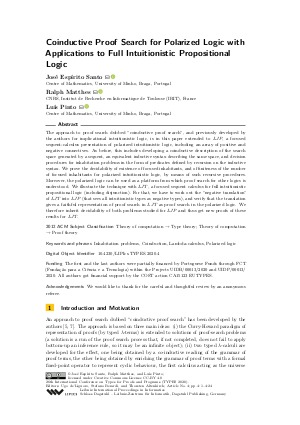@InProceedings{espiritosanto_et_al:LIPIcs.TYPES.2020.4,
author = {Esp{\'\i}rito Santo, Jos\'{e} and Matthes, Ralph and Pinto, Lu{\'\i}s},
title = {{Coinductive Proof Search for Polarized Logic with Applications to Full Intuitionistic Propositional Logic}},
booktitle = {26th International Conference on Types for Proofs and Programs (TYPES 2020)},
pages = {4:1--4:24},
series = {Leibniz International Proceedings in Informatics (LIPIcs)},
ISBN = {978-3-95977-182-5},
ISSN = {1868-8969},
year = {2021},
volume = {188},
editor = {de'Liguoro, Ugo and Berardi, Stefano and Altenkirch, Thorsten},
publisher = {Schloss Dagstuhl -- Leibniz-Zentrum f{\"u}r Informatik},
address = {Dagstuhl, Germany},
URL = {https://drops.dagstuhl.de/entities/document/10.4230/LIPIcs.TYPES.2020.4},
URN = {urn:nbn:de:0030-drops-138837},
doi = {10.4230/LIPIcs.TYPES.2020.4},
annote = {Keywords: Inhabitation problems, Coinduction, Lambda-calculus, Polarized logic}
}

 Creative Commons Attribution 4.0 International license
Creative Commons Attribution 4.0 International license
















